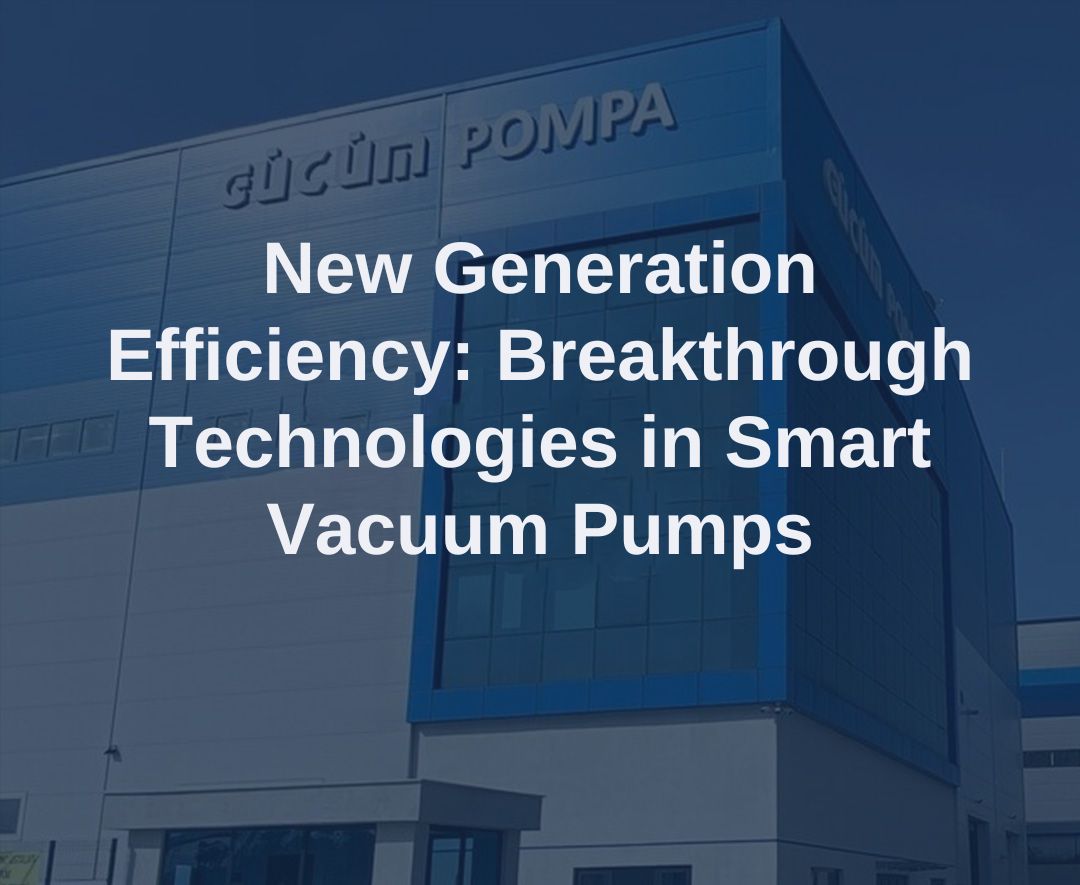New Generation Efficiency: Breakthrough Technologies in Intelligent Vacuum Pumps
Table of Contents
- What Innovations in Smart Vacuum Pumps Increase Energy Efficiency?
- Why Are New Generation Vacuum Pumps More Effective Than Traditional Systems?
- Do IoT and Artificial Intelligence in Smart Vacuum Pumps Really Make a Difference?
- Groundbreaking Smart Vacuum Pump Technologies in Energy Savings
- Critical Technologies to Consider When Choosing a Smart Vacuum Pump
- Smart vs. Classic Vacuum Pumps: Which Is More Profitable?
What Innovations in Smart Vacuum Pumps Increase Energy Efficiency?
Today, as energy consumption has become one of the biggest cost factors in industry, smart vacuum pumps offer solutions that make a difference in this area. Thanks to new generation control units, pumps operate only at the capacity needed, preventing unnecessary energy consumption. Instead of motors running at fixed speed in traditional vacuum pumps, models using variable speed drives (VSD) can reduce consumption by an average of twenty to thirty percent.
Another innovation providing energy efficiency is IoT-based monitoring systems. With this technology, operators can remotely monitor pump performance and foresee maintenance needs in advance. This prevents unplanned downtime and ensures uninterrupted production processes. Also, smart sensors continuously monitor factors such as ambient pressure, temperature, and humidity, keeping pumps at optimal settings.
Thanks to newly developed automation software, vacuum systems can work integrated with other machines in the factory, increasing overall energy efficiency. For example, in lines where multiple pumps are connected, load sharing can be done automatically and the most efficient combination is selected. This reduces both electricity consumption and maintenance costs.
Especially in food, pharmaceutical, and automotive sectors, where uninterrupted operation is important for hygiene and quality standards on production lines, smart vacuum pump preferences give companies a competitive advantage. Besides lowering energy costs, these systems also contribute to environmentally friendly operation goals and offer a transformation compatible with Industry 4.0 vision. Investing in the right technology to save in production has become the key to high efficiency in the long term.
Why Are New Generation Vacuum Pumps More Effective Than Traditional Systems?
Although vacuum systems have long been indispensable in industrial production lines, new generation vacuum pumps offer significant advantages in performance and efficiency compared to traditional models. Foremost among these is the variable speed drive (VSD); this technology automatically adjusts pump speed according to need, providing energy savings. Thus, unnecessary electricity consumption is minimized and operating costs decrease.
Smart sensors and control units allow systems to monitor parameters such as pressure, temperature, and flow rate in real time during operation and optimize themselves. This means stable performance and longer device lifespan. Additionally, IoT integration offers remote monitoring and management; users can see real-time operating data of pumps and intervene much faster.
Another important difference appears in maintenance. While traditional pumps require maintenance at fixed intervals, smart vacuum pumps monitor themselves and call for maintenance only when truly necessary. This reduces the risk of unplanned downtime and increases production continuity. Along with energy savings, these new generation systems stand out with eco-friendly design and low carbon footprint, contributing both cost advantages and sustainability goals.
Do IoT and Artificial Intelligence in Smart Vacuum Pumps Really Make a Difference?
As efficiency pressure in industrial processes increases every day, smart vacuum pumps become much smarter with IoT and artificial intelligence to meet this need. Sensors collecting real-time data monitor critical parameters such as temperature, pressure, and flow rate instantly, preventing unexpected failures. Moreover, these systems send alerts to maintenance teams only when needed, saving both time and costs.
Artificial intelligence algorithms analyze past performance data to create optimal operating scenarios. This leads to a significant reduction in energy consumption while ensuring production continuity. Considering dozens of pumps used in large facilities, the total cost advantage of this smart management infrastructure becomes undeniable.
IoT integration, which increases overall production line efficiency, also offers remote monitoring and control. That means business owners can see pump status and performance data in real time from anywhere in the world. This accelerates decision-making processes and contributes to proactive management of potential risks.

Groundbreaking Smart Vacuum Pump Technologies in Energy Savings
Today, energy efficiency is not only a cost advantage but also a fundamental part of sustainability goals for industrial enterprises. Smart vacuum pump technologies truly break new ground in this area. Especially new generation pumps equipped with IoT-based sensors monitor pressure and flow data in the system in real time, switching to the appropriate operating mode according to demand. This provides significant savings in electricity consumption and extends equipment lifespan.
Traditional pumps running at fixed speed often lead to unnecessary energy use. However, smart vacuum pump systems can adjust themselves according to real demand in the production line thanks to variable speed control. AI-supported algorithms create the most suitable performance scenarios through analysis of past data and keep the system stable even during unexpected load fluctuations.
Some models can be remotely monitored and controlled through cloud-based software. Maintenance teams receive real-time reports and alerts, minimizing failure risks. These technologies not only reduce energy bills but also significantly cut maintenance costs. Additionally, smart vacuum pump solutions contribute to uninterrupted production processes, increasing overall efficiency.
In sectors where energy consumption can reach up to fifty percent of production costs, the savings provided by these innovative systems can reach impressive levels. Moreover, they play a critical role in reducing carbon emissions. Advantages like smart control, fast adaptation, and predictive maintenance help businesses become stronger both environmentally and economically.
Critical Technologies to Consider When Choosing a Smart Vacuum Pump
Smart vacuum pumps play a critical role in energy efficiency and performance in industrial applications. When selecting these pumps, priority should be given to technologies that provide energy savings. Especially the use of variable frequency drives (VFD) prevents unnecessary energy consumption by adjusting pump speed according to demand. Thus, operating costs decrease and environmental sustainability is supported.
Another important criterion is smart sensor systems and IoT integration. These technologies collect real-time performance data of pumps, enabling early fault detection and optimizing maintenance processes. This minimizes production interruptions and increases system reliability. Additionally, remote monitoring and control options significantly enhance operational efficiency.
AI-supported optimization systems are also among notable innovations in smart vacuum pumps. AI algorithms continuously analyze pump operating conditions and determine the optimal working mode. This prevents pump overload and minimizes energy consumption. As a result, both pump lifespan is extended and maintenance costs are reduced.
Finally, pump material quality and selection of high-efficiency motor technologies have a significant impact on energy savings. Pumps made with durable materials like stainless steel offer long life and low maintenance requirements. Also, advanced technology motors operate with low energy loss, helping reduce your business’s carbon footprint.
Smart vs. Classic Vacuum Pumps: Which Is More Profitable?
The differences between traditional models and smart vacuum pumps directly affect businesses’ cost and efficiency expectations. Classic pumps usually have lower initial investment costs but can increase costs over time due to energy consumption and maintenance needs. On the other hand, smart pumps reduce operating expenses with advanced energy-saving technologies while optimizing business performance.
Smart vacuum pumps continuously monitor and optimize working conditions thanks to IoT-based sensors and automatic control systems. This technology prevents unnecessary energy use and minimizes failure risks. Meanwhile, traditional models have limited optimization capabilities and often require manual intervention, which can be a significant disadvantage for business continuity.
Additionally, remote access and data analytics features offered by smart pumps allow for more accurate maintenance planning. This reduces unexpected downtime and high repair costs. Classic pumps generally require scheduled maintenance at predetermined intervals, which can negatively affect operational efficiency.
When conducting cost analysis, focus not only on purchase price but also on long-term operating expenses. Factors like energy efficiency, maintenance frequency, and pump lifespan are decisive in the profitability calculation. Moreover, as energy costs increase their share in total expenses, the advantage of smart pumps becomes even more prominent.


